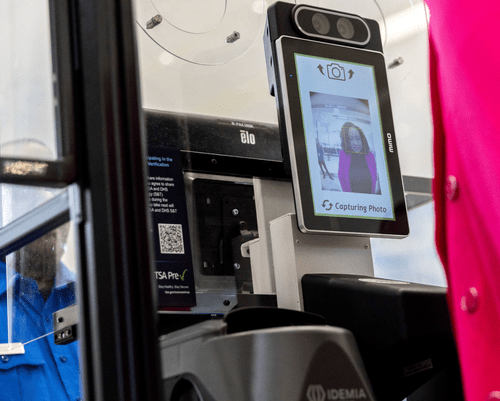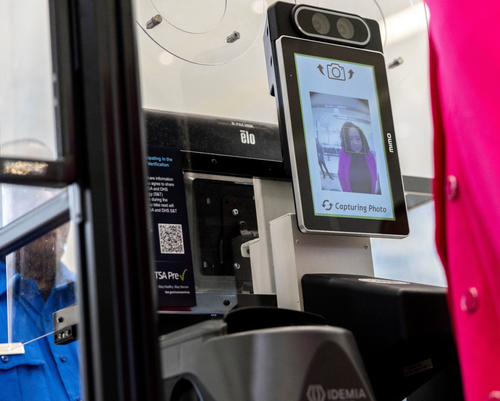The next time you find yourself at airport security, prepare to look directly into a camera. The Transportation Security Administration is quietly testing controversial facial recognition technology at airports nationwide.
AP News said 16 airports, including Baltimore-Washington International Thurgood Marshall and Reagan National near Washington, as well as ones in Atlanta, Boston, Dallas, Denver, Detroit, Las Vegas, Los Angeles, Miami, Orlando, Phoenix, Salt Lake City, San Jose, and Gulfport-Biloxi and Jackson in Mississippi, have installed kiosks with cameras (at some TSA checkpoints) that allow passengers to insert their government-issued ID and look into a camera as facial recognition technology asses if the ID and person match.
Here’s what to expect at airports utilizing this new technology:
Travelers put their driver’s license into a slot that reads the card or place their passport photo against a card reader. Then they look at a camera on a screen about the size of an iPad, which captures their image and compares it to their ID. The technology is both checking to make sure the people at the airport match the ID they present and that the identification is in fact real. A TSA officer is still there and signs off on the screening. – AP
“What we are trying to do with this is aid the officers to actually determine that you are who you say who you are,” said Jason Lim, identity management capabilities manager, during a recent demonstration of the technology to reporters at BWI.
TSA said the pilot test is voluntary, and passengers can opt out. The facial recognition technology has raised concerns among critics, like five senators (four Democrats and an Independent) who sent a letter in February to the TSA requesting the pilot test be halted immediately.
“Increasing biometric surveillance of Americans by the government represents a risk to civil liberties and privacy rights,” the senators said.
The letter continued:
“We are concerned about the safety and security of Americans’ biometric data in the hands of authorized private corporations or unauthorized bad actors.”
“As government agencies grow their database of identifying images, increasingly large databases will prove more and more enticing targets for hackers and cybercriminals.”
Meg Foster, a justice fellow at Georgetown University’s Center on Privacy and Technology, is concerned that even though the TSA says it’s not storing biometric data, it collects, “What if that changes in the future?”
Jeramie Scott, with the Electronic Privacy Information Center, said that even though the TSA facial recognition kiosks are being tested, it could be only a matter of time before it becomes a more permanent fixture at checkpoints.
Despite the US being a first-world country, it has third-world protections for its people. There’s an increasing number of government agencies that want your biometric data. Even the IRS wants your face.









